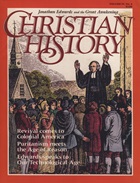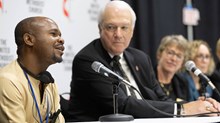Typical of many other serious young men of his day, the young Jonathan Edwards drew up a list of resolutions, committing himself to a God-centered life lived in harmony with others. The list, excerpted here, was probably first written down in 1722 and added to at several times in his lifetime. There are seventy resolutions in all. The excerpts here give a picture of the seriousness and resolve with which Edwards approached life.
Being sensible that I am unable to do any thing without God’s help, I do humbly intreat Him by His grace to enable me to keep these resolutions, so far as they are agreeable to His will, for Christ’s sake.
Resolved, That I will do whatsoever I think to be most to God’s glory, and my own good, profit and pleasure, in the whole of my duration.
Resolved to do whatever I think to be my duty, and most for the good and advantage of mankind in general.
Resolved to do this, whatever difficulties I meet with, how many and how great soever.
Resolved, Never to lose one moment of time, but improve it the most profitable way I possibly can.
Resolved, Never to do any thing, which I should be afraid to do, if it were the last hour of my life.
Resolved, To be endeavoring to find out fit objects of charity and liberality.
Resolved, To maintain the strictest temperance in eating and drinking.
Resolved, Never to do any thing, which if I should see in another, I should count a just occasion to despise him for, or to think any way the more meanly of him.
Resolved, To study the Scriptures so steadily, constantly and frequently, as that I may find, and plainly perceive myself to grow in the knowledge of the same.
Resolved, To strive to my utmost every week to be brought higher in religion, and to a higher excercise of grace, than I was the week before.
Resolved, To ask myself at the end of every day, week, month and year, wherein I could possibly in any respect have done better.
Resolved, Frequently to renew the dedication of myself to God, which was made at my baptism, which I solemnly renewed, when I was received into the communion of the church; and which I have solemnly re-made this twelfth day of January, 1722–3.
Resolved, Never hence-forward, till I die, to act as if I were any way my own, but entirely and altogether God’s.
Resolved, I will act so as I think I shall judge would have been best, and most prudent, when I come into the future world.
Resolved, Never to give over, nor in the least to slacken my fight with my corruptions, however unsuccessful I may be.
Resolved, After afflictions, to inquire, what I am the better for them, what good I have got by them, and what I might have got by them.
Although his biography presents many dramatic contrasts, these were in reality only different facets of a common allegiance to a sovereign God. Thus, Edwards both preached ferocious hell-fire sermons and expressed lyrical appreciations of nature because the God who created the world in all its beauty was also perfect in holiness. Edwards combined herculean intellectual labors with child-like piety because he perceived God as both infinitely complex and blissfully simple. In his Northampton church his consistent exaltation of divine majesty led to very different results—he was first lionized as a great leader and then dismissed from his pulpit. Edwards held that the omnipotent deity required repentance and faith from his human creatures so he proclaimed both the absolute sovereignty of God and the urgent responsibilities of men.
Mark A. Noll is professor of history at Wheaton College, Wheaton, Illinois. He is an editor of Eerdman's Handbook of Christianity in America, and the author of Christians and the American Revolution.
Copyright © 1985 by the author or Christianity Today/Christian History magazine.
Click here for reprint information on Christian History.

Support Our Work
Subscribe to CT for less than $4.25/month




























